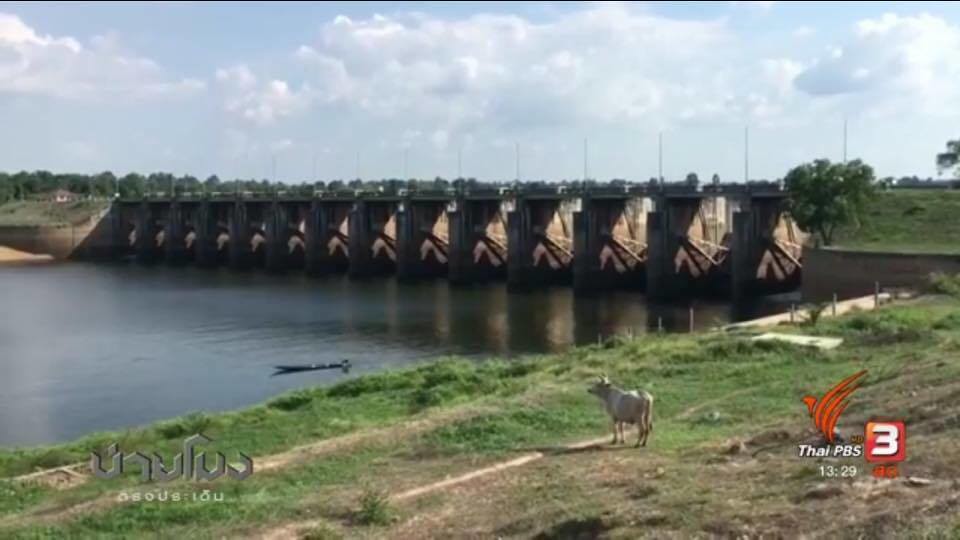The proposal to collect water fees from rice farmers is the first step towards the commodification of water resources, which will accelerate the collapse of small-scale farmers who are already struggling to make ends meet.
Last month, the Ministry of Natural Resources and Environment (MNRE) introduced a Water Resource Bill. Although the bill seems to target large industries, the bill will also charge 0.50 baht per cubic metre of water from rice farmers with more than 50 rai (8 hectares) of land, something that has quickly led to widespread public debate.
Charging farmers for water is a not new idea. In fact, it has been attempted several times before, but was always blocked, primarily because Thai society believes that rice farmers are the backbone of the country.
According to Witoon Lianchamroon, Secretary of the BioThai Foundation (BioThai), the main principle of the bill is good if one judges from certain details which have been discussed so far. But the downside is that it could lead to the collapse of small-scale farms in the country.

Commodification of water
Witoon said there are a few interesting points in the bill, which has not yet been finalised. But it is clear that if enacted, the bill will pave the way to the commodification or privatisation of water.
“I read an interview after there was some opposition and people on the committee and in the Department of Water Resources were talking from the viewpoint that the bill has a good feature in that it creates an opportunity for the private sector to get into water management,” said Witoon, adding that the principles of the bill seem to fit in with the suggestions to the Thai government from the Asian Development Bank and the World Bank.
“Many aspects of the bill are good, such as making large operations like golf courses pay water fees, which would create justice in resource use,” said Witoon.
Rising production costs for rice farmers
Although it is too early to foresee the outcome of the bill, the commodification of water is worrisome as it will surely affect small-scale farmers, most of whom are already facing difficulties.
In past decades, many small-scale farmers in central Thailand have become tenant farmers. According to the water rates proposed in the bill, farmers working on plots larger than 50 rai will have to pay a water fee of 800 baht per rai, adding to their production cost.
“I already anticipate that under the current structure where water fees are not an issue, the number of rice farmers will already have to shrink rapidly. We must create alternatives, so when they can’t move to other production sectors, they can still live sufficiently well. But if we add this condition it would encourage an accelerated collapse,” said Witoon.
The Secretary of BioThai also said that while small-scale rice farmers will be carrying the burden of the bill in rising production costs, large-scale agricultural businesses, such as the corn and sugarcane industries, do not have to worry as much.
“For example, sugarcane is the most water intensive plant, but the state has a policy to subsidise the sugarcane industry. This means that the industry can use as much water as they like because the burden is transferred to the consumers … investors in large-scale agricultural businesses have ties with the government on many levels,” said Witoon.
Inefficiency of Thailand’s irrigation systems
In developing countries, it is uncommon for governments to collect water fees from farmers unless the country suffers water scarcity, such as in many parts of India, where water fees constitute a large proportion of production costs. In industrialised countries, however, with better irrigation systems which boost the productivity of agricultural products, the profit from the incresed productivity usually outstrip the cost of water.
Witoon said good irrigation systems could increase productivity by up to 30 per cent. So increased productivity could pay for the water fees. Thailand, however, does not provide efficient irrigation systems for farmers and many still have to pay for the cost of pumping water into their farmlands themselves.
“But the problem of developing countries where there is commodification of water is mostly a problem of using water for consumption with private companies as the operators instead of the state,” said Witoon. “In Latin America, there many countries which have done this, and they have found that water fees collected by private companies are very high, although the water is from public sources”
Not the right time yet
To conclude, Witoon said the state should come up with mechanisms to ensure that the livelihoods of small-scale farmers will be intact to ensure food security.
The government should initiate policies to help small-scale farmers to adjust without adding to their burden, while also allowing people who live in areas with water sources to play a part in formulating policies to conserve and use water resources more effectively.
“They should manage water resources and irrigation systems more effectively without collecting water fees from small-scale farmers, until they can build productivity beyond their increased production costs,” said Witoon.
Prachatai English is an independent, non-profit news outlet committed to covering underreported issues in Thailand, especially about democratization and human rights, despite pressure from the authorities. Your support will ensure that we stay a professional media source and be able to meet the challenges and deliver in-depth reporting.
• Simple steps to support Prachatai English
1. Bank transfer to account “โครงการหนังสือพิมพ์อินเทอร์เน็ต ประชาไท” or “Prachatai Online Newspaper” 091-0-21689-4, Krungthai Bank
2. Or, Transfer money via Paypal, to e-mail address: [email protected], please leave a comment on the transaction as “For Prachatai English”
